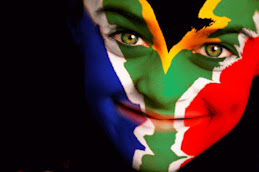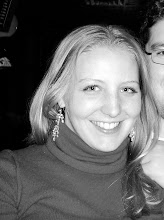I came that they may have life and have it abundantly.
- John 10:10
There are days in South Africa when I often feel that I travel between two different universes, especially when I work at the crèche. In the morning I catch a kombi taxi, which shuttles domestic workers to and from the upper-middle class neighborhood where I live, to town. In town I catch another taxi out to the townships. The drivers that don’t recognize me often assume I’m a health professional going to the public hospital. What other business would a young, decently dressed white woman with a backpack have in the poorest, almost entirely black part of town? They are always surprised when I tell them I volunteer at a crèche. A taxi driver once asked incredulously, “You came all the way to South Africa to work at a crèche?” (To work with pre-school children is perhaps even less glamorous than working in hospital.)
 How is it possible, that within the same city, shacks made of sticks, mud and corrugated metal can exist beside luxury homes with granite counter kitchens and swimming pools? A failing public health system with no medications or sterile gloves and world-class private health facilities? Dysfunctional township schools riddled with violence and prestigious prep schools? The gross inequality between the rich and poor is one of the defining characteristics of South African society. In fact, it has one of the widest disparities in wealth of any country in the world. Though a volunteer living on a modest stipend, by virtue of the color of my skin and a certain amount of social capital, I have the ability to travel between these worlds at will. Many, in fact the majority, of South Africans do not have this privilege. I often feel caught between these worlds, comfortable in neither, riding the kombis between them every day.
How is it possible, that within the same city, shacks made of sticks, mud and corrugated metal can exist beside luxury homes with granite counter kitchens and swimming pools? A failing public health system with no medications or sterile gloves and world-class private health facilities? Dysfunctional township schools riddled with violence and prestigious prep schools? The gross inequality between the rich and poor is one of the defining characteristics of South African society. In fact, it has one of the widest disparities in wealth of any country in the world. Though a volunteer living on a modest stipend, by virtue of the color of my skin and a certain amount of social capital, I have the ability to travel between these worlds at will. Many, in fact the majority, of South Africans do not have this privilege. I often feel caught between these worlds, comfortable in neither, riding the kombis between them every day.The South African city in which I live and work is a microcosm of the global reality of socio-economic inequality. Americans live in the wealthiest, most militarily powerful society in the history of the world though they represent a tiny fraction of the world’s population. And yet according to Jeffrey Sachs, a development economist, “Almost three thousand people died needlessly and tragically at the World Trade Center on September 11; ten thousand Africans die needlessly and tragically every single day…of AIDS, TB, and malaria” (my emphasis). According to the UN Human Development Index, half the world’s population lives on less than $2 a day. And yet for me, these statistics were not enough, only numbers in the pages of books and NGO reports. Although not my initial motivation, I traveled over seven thousand nautical miles to come face to face with global inequality. I traveled on a jet plane only once to negotiate the space between two different worlds daily.
 I thought that I was coming to South Africa to come face to face with poverty, to witness the stories of and walk alongside individuals. The poor are not people comfortably “out there” living in another world, although we construct our societies in such a way that it becomes easy to avoid them. (In South Africa people that are poor are relegating to townships and inner city neighborhoods, places people advised not to go and are not highlighted in guide books.) And yet I realize now that to talk about poverty is not enough. The daily realities faced by individuals, families and entire societies living in poverty are indeed tragic and dehumanizing. As Christians it is important that we have an understanding of poverty, but this is not enough.
I thought that I was coming to South Africa to come face to face with poverty, to witness the stories of and walk alongside individuals. The poor are not people comfortably “out there” living in another world, although we construct our societies in such a way that it becomes easy to avoid them. (In South Africa people that are poor are relegating to townships and inner city neighborhoods, places people advised not to go and are not highlighted in guide books.) And yet I realize now that to talk about poverty is not enough. The daily realities faced by individuals, families and entire societies living in poverty are indeed tragic and dehumanizing. As Christians it is important that we have an understanding of poverty, but this is not enough.We also need to be talking about wealth. Is it not also tragic and dehumanizing that citizens of developed countries can maintain such a high standard of living in the context of so much poverty? As an American, though raised in what I understood as middle class family, I have realize that I too come from a society of incredible wealth and privilege. I too participate in systems that maintain inequality. Our entire global society, not just those of live in poverty, is in need of transformation. The only thing that is really comfortably “out there” is the moon! Wealthy and poor alike exist together in this world, and we are all in need of God’s healing and transformative grace because of the sins we have committed against God and one another.
 Jesus said that he came that we might have life and have it abundantly. What is the abundant life? Is it the American standard of living or something far simpler and more sustainable? Was abundance intended for the wealthy few or for all of humanity? For rich Christians, this realization requires a deep, sincere look at and engagement with the huge disparities between the developed and the developing world, extraordinary privilege and desperate poverty. This gap is not something “out there” on those “problem continents” but a reality in which all participate. Living in South Africa, I have entered into this tension. I invite you too, through your growing awareness, to enter into this space, to “travel” back and forth between these worlds. It is my sincere hope that we invite God’s presence, in abundance, to reconcile them. I pray that it may be so.May Highlights
Jesus said that he came that we might have life and have it abundantly. What is the abundant life? Is it the American standard of living or something far simpler and more sustainable? Was abundance intended for the wealthy few or for all of humanity? For rich Christians, this realization requires a deep, sincere look at and engagement with the huge disparities between the developed and the developing world, extraordinary privilege and desperate poverty. This gap is not something “out there” on those “problem continents” but a reality in which all participate. Living in South Africa, I have entered into this tension. I invite you too, through your growing awareness, to enter into this space, to “travel” back and forth between these worlds. It is my sincere hope that we invite God’s presence, in abundance, to reconcile them. I pray that it may be so.May Highlights- Attending a Young Adults League circuit conference
- Attending several theological cafes and a lecture at the School of Religion and Theology at the University of KwaZulu-Natal (UKZN)
- Co-facilitating a Peer Education workshop with PACSA’s Gender and HIV/AIDS Desk
- Preparing a statement on the theology of accompaniment for PACSA in consultation with staff and academics
- Creating teaching aids, especially an entire alphabet complete with pictures, and attending my first parent meeting at the crèche


